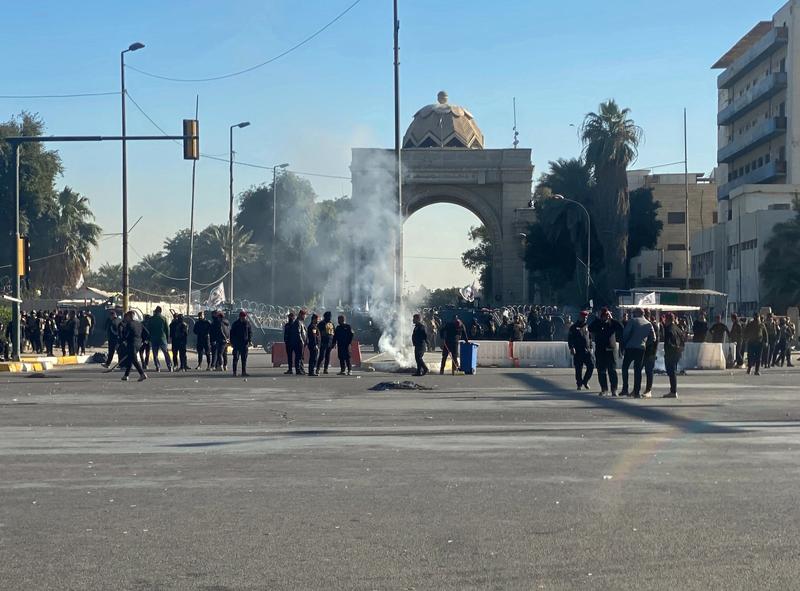 Security forces close the Green Zone government areas while protesters denouncing election results burn garbage nearby, in Baghdad, Iraq, Dec 27, 2021. (ALI ABDUL HASSAN / AP)
Security forces close the Green Zone government areas while protesters denouncing election results burn garbage nearby, in Baghdad, Iraq, Dec 27, 2021. (ALI ABDUL HASSAN / AP)
Following the withdrawal of the United States-led combat mission in Iraq in December, the country’s socioeconomic development path will depend on its incoming government and how it prioritizes people’s livelihood issues, experts say.
Iraq’s new parliament will convene on Jan 9 and elect its speaker. Within 30 days of this session, the parliament should elect a new president who will task the biggest bloc with forming the government.
On Dec 27, Iraq’s Supreme Court ratified the parliamentary election, held in October, which the Sadrist movement bloc, led by Muqtada al-Sadr, won 73 seats, more than any other group in the 329-seat house.
The Sadrist movement, named after prominent clerics from the al-Sadr family, emerged after former Iraqi president Saddam Hussein was deposed in 2003 by a coalition led by the US.
Nagapushpa Devendra, an analyst at the West Asia Centre of the Manohar Parrikar Institute for Defence Studies and Analyses in New Delhi, said that in order to solve the problems faced by Iraqi society, the incoming administration needs to strike a balance between the demands of various sects and political parties
Zaid Al-Ali, a lawyer and former legal adviser to the United Nations, said the negotiations to form a new government will depend on how specific parties position themselves.
Al-Ali, who is also the author of The Struggle for Iraq’s Future and Arab Constitutionalism: The Coming Revolution, told China Daily that while Iraq still faces threats from various terrorist groups, the country’s security forces are now better prepared to tackle these challenges.
“The best approach would be to deal with the social conditions throughout Iraq and improve (the people’s living standards) to reduce terrorist groups' capacity to recruit and carry out attacks,” said Al-Ali.
Nagapushpa Devendra, an analyst at the West Asia Centre of the Manohar Parrikar Institute for Defence Studies and Analyses in New Delhi, said that in order to solve the problems faced by Iraqi society, the incoming administration needs to strike a balance between the demands of various sects and political parties.
“Since the fall of Saddam Hussein, political elections have led to the formation of unwieldy (coalition) governments,” Devendra told China Daily.
In March 2003, the US invaded Iraq – which was ruled by Saddam from 1979 to 2003 – on the basis of false intelligence that the Middle Eastern nation was developing weapons of mass destruction. The then United Nations secretary-general Kofi Annan called the war illegal and that it “was not in conformity with the UN Charter”.
ALSO READ: Sources: Drone attack on US base in Iraq foiled
Though it was announced earlier that the 3,000 US combat troops in Iraq would exit by Dec 31, 2021, Iraqi Prime Minister Mustafa al-Kadhimi said a few hundred US troops would remain behind to provide support and advice to Iraq’s security forces, according to a report by Xinhua on Jan 5.
Devendra noted that Iraq continues to play a significant role in the US’ actions to secure its multilateral interests in the region.
According to a Wall Street Journal report on Dec 31, the US had spent $14 trillion on the wars in Afghanistan and Iraq since the Sept 11, 2001, terrorist attacks on the US, noting that America’s military interventions had created “opportunities for profit” as the wars in the two countries stretched on.
According to the Global Terrorism Index 2020, an annual report produced by the Institute for Economics and Peace, a nonprofit think tank based in Sydney, Afghanistan was the country most impacted by terrorism, overtaking Iraq in 2018.
“Daesh was able to grow in the way that it did because of a number of factors, including a weak security sector, corruption and injustice,” said Al-Ali, the Iraqi author. Daesh is an Arabic acronym for the “Islamic State of Iraq and Syria” or ISIS.
Amjed Rasheed, a senior researcher at Open Think Tank, a non-profit organization based in the Kurdistan region of Iraq, said ISIS, which exists in some territories in Syria and Iraq, continues to pose a threat to Iraq.
US President Joe Biden agreed with the Iraqi government to end the combat mission of the American forces in Iraq. “All signs indicate a consistent US policy in Iraq, but I do not think there will be a dramatic change soon,” Rasheed told China Daily.
“As for what the agreement specifically means, the matter will depend a lot on Iran's nuclear negotiations and the future of US policy and its options towards Teheran,” he added.
READ MORE: Halliburton, Exxon in talks for stake in Iraq oil field
The US and Iran are currently engaged in indirect talks to revive the 2015 Iran nuclear deal, also known as the Joint Comprehensive Plan of Action, from which former US President Donald Trump unilaterally withdrew in 2018.
Al-Ali said the main challenge for a new Iraqi government will be the need to balance the demands of various political groups, which “expect rewards to flow from their participation in parliament and government”, with the growing demands of a population that is deeply dissatisfied with the political system.
“Since 2003, the (Iraqi) government has only served as a power-sharing arrangement for political elites and close to no benefits have flowed to the general population. This is a totally unsustainable (situation) and is one of the main reasons for the uprising that took place in 2019,” said Al-Ali.
In October 2019, protests were held against corruption, poor governance, and a lack of public services.
“If the new government wishes to avoid another uprising, it will have to make a serious attempt to improve the standards of living in the country,” he added.


